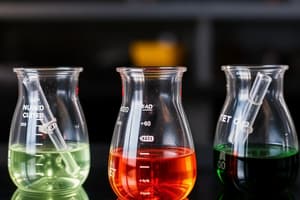Podcast
Questions and Answers
In the reaction $4Fe + 3O₂ → 2Fe₂O₃$, what is happening to iron?
In the reaction $4Fe + 3O₂ → 2Fe₂O₃$, what is happening to iron?
- Iron is oxidized. (correct)
- Iron remains unchanged.
- Iron is reduced.
- Iron is formed from an oxide.
Reduction involves the loss of electrons.
Reduction involves the loss of electrons.
False (B)
What mnemonic device can help remember the relationship between oxidation and reduction?
What mnemonic device can help remember the relationship between oxidation and reduction?
LEO the lion says GER
The oxidation number of hydrogen in most compounds is typically equal to ______.
The oxidation number of hydrogen in most compounds is typically equal to ______.
Match the substances with their roles in a redox reaction:
Match the substances with their roles in a redox reaction:
Which of the following is a rule for determining oxidation numbers?
Which of the following is a rule for determining oxidation numbers?
Redox reactions can occur in isolation without requiring a counterpart reaction.
Redox reactions can occur in isolation without requiring a counterpart reaction.
What must be equal in any redox reaction?
What must be equal in any redox reaction?
A common standardized solution used in redox titrations is acidified ______.
A common standardized solution used in redox titrations is acidified ______.
Which agent can become oxidized in a redox reaction?
Which agent can become oxidized in a redox reaction?
Flashcards
Reduction
Reduction
The process where a substance gains electrons, resulting in a decrease in oxidation number.
Oxidation
Oxidation
The process where a substance loses electrons, resulting in an increase in oxidation number.
Oxidizing Agent
Oxidizing Agent
A substance that causes the oxidation of another substance by accepting electrons. It itself gets reduced in the process.
Reducing Agent
Reducing Agent
Signup and view all the flashcards
Redox Reaction
Redox Reaction
Signup and view all the flashcards
Half-Reaction
Half-Reaction
Signup and view all the flashcards
Oxidation Number
Oxidation Number
Signup and view all the flashcards
Balancing Redox Reactions in Acidic Conditions
Balancing Redox Reactions in Acidic Conditions
Signup and view all the flashcards
Balancing Redox Reactions in Basic Conditions
Balancing Redox Reactions in Basic Conditions
Signup and view all the flashcards
Redox Titration
Redox Titration
Signup and view all the flashcards
Study Notes
Electrochemistry: Oxidation & Reduction
- Oxidation was historically involving the addition of oxygen
- Reduction was historically the formation of metals from their natural ores
- Reduction is the gain of electrons.
- Oxidation is the loss of electrons.
- LEO the lion says GER (Loss of Electrons is Oxidation, Gain of Electrons is Reduction)
- Oxidizing agents cause oxidation of other materials
- Reducing agents cause reduction of other materials
Oxidation Numbers
- Oxidation numbers are assigned to each atom in a compound
- The oxidation number of a neutral atom is zero
- The oxidation number of a simple ion is equal to its charge
- Oxidation numbers can vary when working with redox reactions
Rules for Determining Oxidation Numbers (ON)
- The sum of oxidation numbers in a neutral compound is zero.
- The sum of oxidation numbers in a complex ion is equal to the ion's charge.
- For monatomic ions, the ON is equal to the charge.
- The ON of oxygen in a compound or complex ion is −2 (except in peroxides where it is −1) and in compounds with fluorine, where it is positive.
- The ON of hydrogen in a compound or complex ion is +1 (except in metal hydrides where it is −1)
- The ON of metals in their elemental state is zero
- The ON of fluorine—always −1
Balancing Redox Reactions
- Half-Reaction Method: separate the redox reaction into half-reactions
- Balance the oxidation half-reaction
- Balance the reduction half-reaction
- Add the two half-reactions using multipliers as coefficients
- Solve for oxidation numbers
- Change to basic if needed by adding OH-
- Collect/cancel any like terms and reduce to lowest terms.
- Balancing Complex Half-Reactions: Polyatomic ions are usually treated as a whole unit
Predicting Redox Reactions
- Identify all species present, including water
- Identify the oxidizing agent (OA) and reducing agent (RA)
- Write the half-reactions for the OA & RA
- Balance the half-reactions
- Determine if the redox reaction will occur
Studying That Suits You
Use AI to generate personalized quizzes and flashcards to suit your learning preferences.




